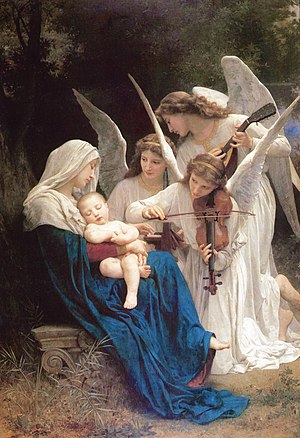 Image via Wikipedia
Image via Wikipedia"She will bear a son,
and you shall call his name Jesus,
for he will save his people from their sins."
...............
Angels are many things, but they are not necessarily "innocent." It is odd how the common conception of angels is that they are pure, holy beings. If I see another piece of infant clothing that refers to a "little angel" I will gag. This is quite foreign to the biblical account because angels are first and foremost, created beings, and second, mere messengers.
First, the fact that angels are created beings should clue us in that they are something less then "holy." Isaiah 6 is a clear example of this. Rather than being holy, they forever testify to the infinitely superior holiness of God: "Holy, Holy, Holy is the Lord God Almighty!" Matthew 1 hints at this as well, by describing the angel as "of the Lord." Its being is not independent of God's, but rather is entirely attached to the source of its existence.
Secondly, that angels are mere messengers is even more clear from Scripture. The first two chapters of Hebrews are prime real estate for this topic. "Are they not all ministering spirits sent out to serve for the sake of those who are to inherit salvation?" (1:14). This is what we are seeing in Matthew 1. Joseph is met by an angel in a dream and he is brought the message of salvation - the gospel - that through Jesus people can be saved from their sins.
Why does all this matter? This appears to be rather trivial, but the importance of defining angels as created messengers becomes clear in Galatians 1:8 - "But even if we or an angel from heaven should preach to you a gospel contrary to the one we preach to you, let him be accursed." Paul is adamant that angels can be overruled. They are not an independently certain source of true knowledge. Our epistemic foundation is better situated in the gospel message of the apostle, over and above a supernatural visit from an angel, who could potentially preach a lie and find himself accursed. Let this be a warning to the extreme mysticism of cults which are based more on visions and angels than on the unchanging promises of God in Scripture (see also Col. 2:18-19). Let this also be a warning to us who pride ourselves in being "biblical" but who daily struggle with trusting God's promises and find ourselves searching for circumstantial signs to direct us in our decision-making. May we continue to put our final hope in God, rather than created messengers or mystical signposts.

![Reblog this post [with Zemanta]](http://img.zemanta.com/reblog_e.png?x-id=76ce6603-0895-4537-a8d2-2d07efe4dbf0)
No comments:
Post a Comment